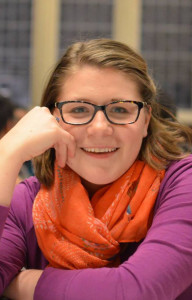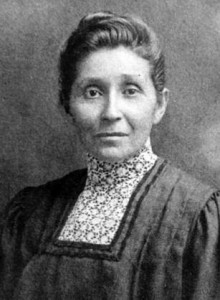When BC senior Marie Pellissier was asked to identify figures associated with the “West,” she had a few ideas.
“Most of the class, myself included, listed men like Buffalo Bill Cody or Sam Houston,” she said. The imagination of the American West, it seemed, had been largely shaped by men.

Marie (User:Pellissm) was a student in Professor Marilynn Johnson’s History of the American West course at Boston College, and she would research and write a Wikipedia article about features of this pioneering phase of American history. That first conversation stuck with her.
“So,” Marie explained, “when [Prof. Johnson] handed around a list of possible Wikipedia topics, I wanted to focus on a strong woman who was able to influence life in the West.”
She found her kindred spirit in Susan LaFlesche Picotte. She was a “strong character,” Marie said. Picotte was from the Omaha tribe, and widely considered to be the first Native American woman to become a physician. If that wasn’t enough, she was also a public health campaigner advocating for preventative medicine and battling tuberculosis with limited funding. She was also a defender of her tribe in many ways, including issues of land allotment rights. By all means, a different kind of pioneer, with a real impact on how history had unfolded for her tribe.

To develop Picotte’s article, Marie worked to find books and journal articles in the Boston College Library. They expanded Picotte’s biography well past its starting point. Along the way, Marie was pioneering a trail of her own.
“I didn’t have any experience with editing Wikipedia before beginning this project,” she told us. She knew it was dangerous academic territory, and remembers being warned, all the way back to middle school, against trusting it. But once she settled in, she came out with a different opinion.
She has a better understanding now of what it takes to get content to stick to Wikipedia, “especially after the process of peer review we went through, and the scrutiny I know my article can receive from other users.”
There were some challenges, however.
“It was very difficult to change my thinking from an analytical frame to a more encyclopedic one, and I found myself wanting to add analysis where it was unnecessary,” she said. “I found it really fun, however, to write for a wide audience, because it pushed my thinking about how I write.”
Writing about Picotte helped Marie understand history in a more vibrant way, to find a connection to a time in history that has few female figures to connect with. Now, on Wikipedia at least, there’s one more, which is crucial when you consider that Wikipedia has fewer, or shorter, articles on women than other encyclopedias. It’s one great example of how student editors are bringing quality articles about women to Wikipedia.
Marie graduates in May, and hopes to eventually end up working in museums or another public history setting in either museum education or digital humanities.
